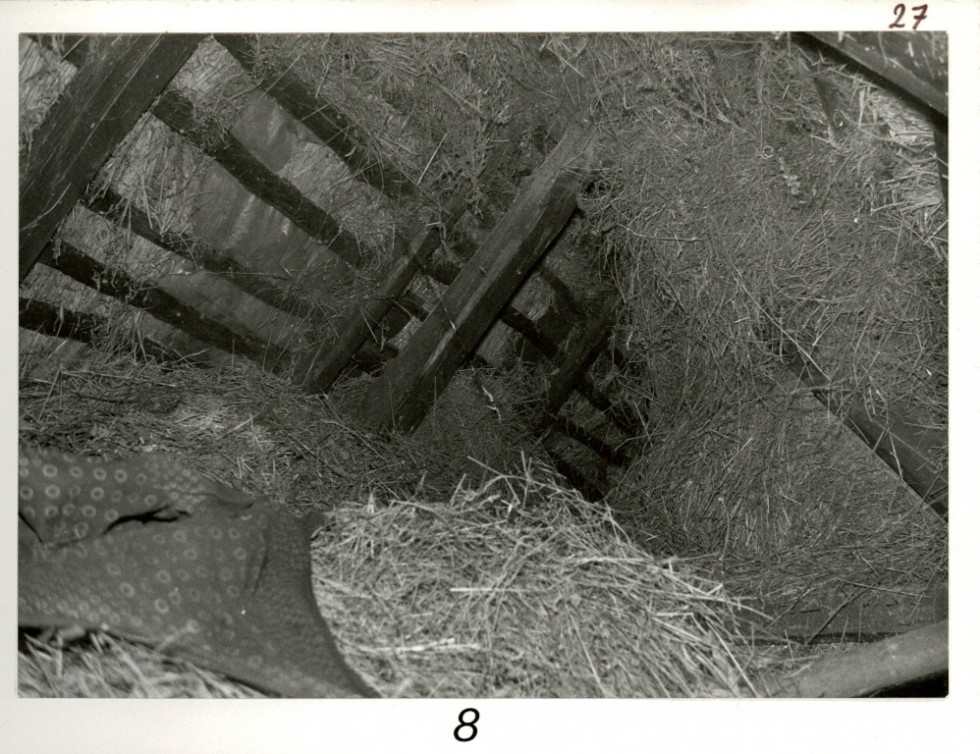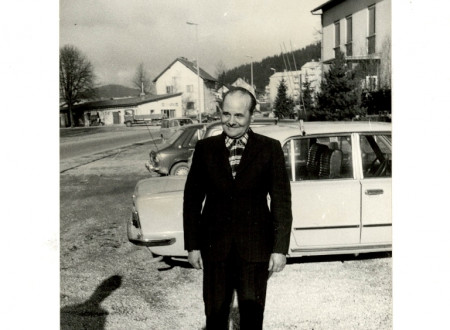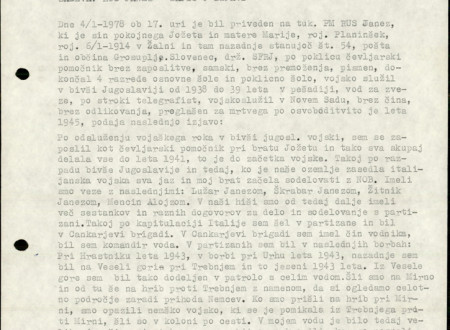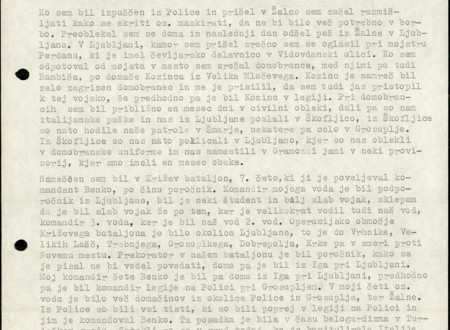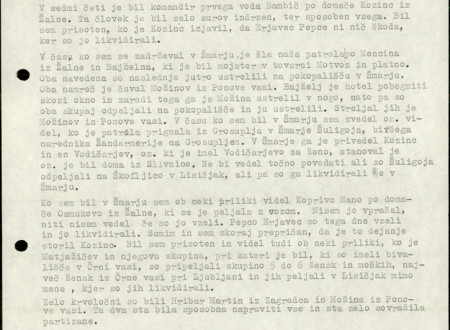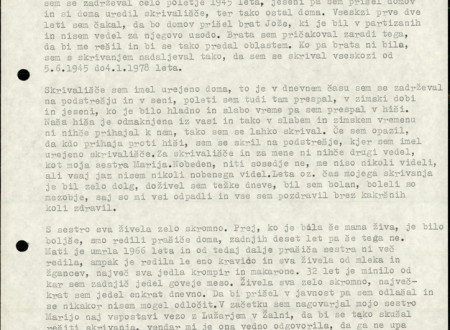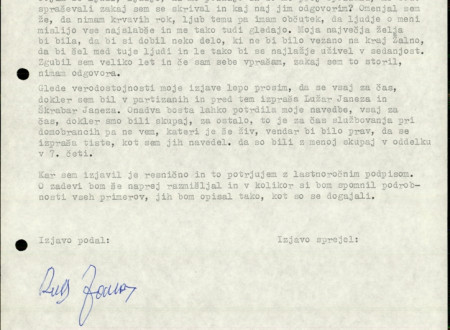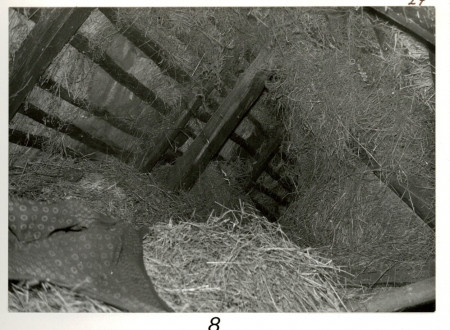»I Was in Hiding for a Very Long Time …«
The Statement of the Former Member of the Home Guard Janez Rus at the End of His 33-Year Long Hiding (May 6, 1945 to January 4, 1978)
The Second World War, which in Europe formally ended on May 8, 1945 with the signing of the German surrender in Berlin, cut into the lives of millions of people. Many of those who survived were for the rest of their lives haunted by images of what went on during the war and by their memories of it. However, in Europe as well as in Asia, many soldiers from the ranks of the defeated armies could not immediately come to terms with the fact that the war was really over. Such individuals, and in some cases even entire military units, were quite frequent occurrence during the first post-war months and even years, particularly east of the newly formed Iron Curtain: in Yugoslavia, Poland, Ukraine and in the Baltic states armed resistance led to fierce battles with the defeated soldiers, who steadfastly refused to admit their defeat – and newly created post-war conditions. These individuals thus remained soldiers, fighting their own “private” wars long after the actual hostilities formally ended, either by launching their own guerrilla attacks or just by hiding and refusing to surrender. Well-known example are Japanese officers and soldiers; the last ones among them were caught (or they surrendered themselves) in Southeast Asia in 1974.
One of the men whose lives were profoundly affected by the war was also Janez Rus (January 6, 1914-May 11, 2001) from Žalna near Grosuplje. Judging from the here published document, the war experience of this pre-war shoemaker’s assistant was very interesting, mirroring much of the complexity of the events that took place during the Second World War in Lower Carniola and also of the difficulty of choice that individuals were faced with at the time. In 1941, Rus was the local Liberation Front activist, who at the time of Italian capitulation, together with his brother, joined the partisans and even became a squad commander. During German offensive the following month he left the partisans and after his release from a German prison made a decision to go to Ljubljana. Although he wished to avoid taking part in any further warfare, when faced with choosing between joining the partisans or the newly established Home Guard, he chose the latter. He was a member of the Home Guard units in Škofljica, later joining the so-called Križ’s battalion, which was under the command of Major Ladislav Križ (1900-1946) and was active in the territory south of Ljubljana during the height of the civil conflict even after changing its name to the First Home Guard Shock Battalion.
Having been previously injured in a traffic accident, Janez Rus stopped being an active soldier of the Home Guard by the end of the war, which is why he did not retreat to Carinthia once the war was drawing to a close. He also chose not to put up armed resistance to the newly established authorities. In his wish to survive, he chose to hide in the forest near his house until the late autumn of 1945, when he made himself a hiding place in the hay in his own stable. It was there that he spent most of his time until January 4, 1978, when he was arrested during the search of his house and outbuilding by members of the Grosuplje police force. In his initial statement he gave some of the reasons for his almost 33-year long hiding – the duration of time that surpassed even that of the aforementioned Japanese soldiers. He was more open about such reasons in his rare appearances in the media after democratization processes in Slovenia had started and Slovenia had gained its independence. He explained that having been a member of the Home Guard, which was responsible for many killings of partisans and their civilian supporters, he was afraid no one would believe his innocence. He was also convinced that, as a surviving soldier of the Home Guard, he would be punished for the crimes committed by others; in the early post-war years, and partly even sometime after that, such fear was indeed well-founded. He also said he was waiting for his brother, who was a partisan and would as such stand up for him. But his brother never returned; fighting as a soldier of the Fourth Battalion of the Cankar Brigade he was in March 1944 killed in an infamous Home Guard attack on the village of Javorovica in the Gorjanci hills. Fearing for his life, Janez thus stayed hidden in his own house and was being taken care of by his mother and his sister.
However, judging from his later statements and partly also from the documents in his personal file, we may come to the conclusion that his long-term hiding did not remain completely hidden. Rus himself believed that rumours about a certain hider, which were being spread among the villagers, eventually reached the policemen in Grosuplje, but since the police were afraid of a supposedly heavily armed former Home Guard soldier, they decided to leave the whole thing alone. Still, years-long fears that Rus might have had while in hiding certainly did not come true once he was finally arrested. When he made his statement and the few surviving partisan villagers testified in his favour, the 64-year old Janez Rus was finally free from hiding. The fact that the whole affair was resolved so quickly and without any prosecution is rather strange, especially considering the fact that between 1977 and 1981, the State Security Service – probably due to the newly awakened interest in post-war mass killings of Home Guard soldiers – led a special operation whose goal was to prosecute Home Guard war criminals who up till then managed to escape their punishment.
In his personal file, however, we can find no statements of his former Home Guard colleagues, who were named by Rus to testify of his innocence; based on the information from the WWII victims database, kept by the Institute for Contemporary History, at least some of them were killed in June 1945.
Tadej Cankar


